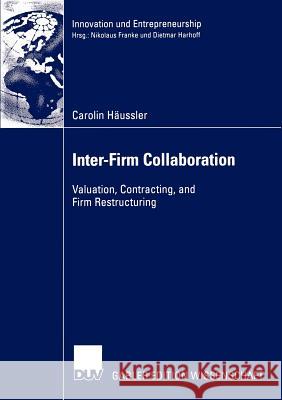Inter-Firm Collaboration: Valuation, Contracting, and Firm Restructuring » książka
Inter-Firm Collaboration: Valuation, Contracting, and Firm Restructuring
ISBN-13: 9783824483334 / Angielski / Miękka / 2005 / 153 str.
The increasing number of inter-firm collaborations suggests that the collaborative mode of organizing transactions has become quite attractive in many industries. Today's firms increasingly operate in highly technology-and knowledge intensive areas where the sources of knowledge are located more diffusely. Moreover, globalization exposes firms to global competition, but also creates tremendous opportunities for exploiting technologies and competencies more fully than in the past. Carolin Haussler's dissertation acknowledges these new challenges and studies various aspects of collaborative arrangements. Among the questions addressed in her thesis are: Do inter-firm collaboration increase firm value? How do partners in a business alliance allocate control rights? Does contractual structure influence performance? Does the collaborative mode of organizing influence firm dynamics? In her dissertation, Carolin Haussler attempts to answer some of these questions. She uses quantitative econometric evidence and qualitative information from firms. In chapter 2, she presents an event study and analyzes stock market reactions to inter-firm collaboration announcements. The findings suggest that not all firms profit equally from inter- firm collaboration. In chapter 3, Carolin Haussler addresses the problems emerging in asymmetrical partnerships, e.g. between large pharmaceutical firms and biotechnology startups. Using a unique dataset on inter-firm collaborations, Haussler finds that the assignment of control rights is mainly related to incentive issues and the bargaining position of firms.











